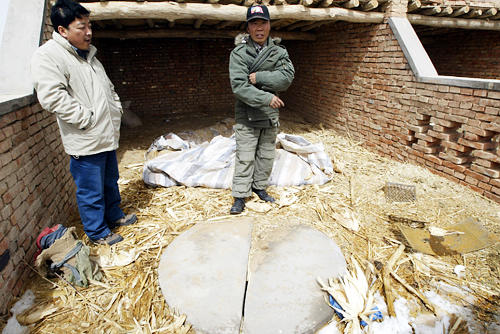|
 |
|
EFFICIENCY MONITORING: Zhang Rongfa (left), a SEE project officer, visits a goat farmer in Alxa to assess the impact of a project carried out by SEE (CFP) |
Zhang also purchased the copyright for the Chinese version of How Much Is Enough, a book on the detrimental effects of consumption and consumer behavior on the world's natural environment, and had it printed. He strongly recommended the book to his fellow SEE members, but never gave a copy away easily. "I only give the book to those with a strong desire to read it. Otherwise, the 700-page book, whose paper consumes a full-grown tree, would be wasted," Zhang said.
Yang said all SEE members had signed a pledge to stop eating shark's fin, a traditional delicacy, or sending or receiving it as a gift.
"We Chinese entrepreneurs are willing to work together with our peers, governments and civil society groups from around the globe to embrace sustainable development and take responsibility for the welfare of future generations," Vanke's Wang read an announcement on behalf of members of SEE and four other Chinese NGOs at a forum during the UN Climate Change Conference in Copenhagen, Denmark, in December 2009.
Liu, who led the efforts to kick-start SEE, never expected that making decisions would be so difficult for an organization consisting of key corporate decision-makers.
At SEE's first general assembly meeting, when Liu, head of the preparatory committee, asked participants to cast ballots on the founding charter his committee had drafted, he was immediately overwhelmed by questions over its contents.
To end the deadlock, someone suggested casting votes to decide whether the charter could be approved in principle. However, Charles Zhang, founder, CEO and President of Sohu.com, a leading Chinese Web portal, stood up and said that "approved in principle" should be clearly defined.
Then some people suggested casting ballots on the draft clause by clause. But Zhang stood up again to question whether a simple majority in favor of a clause was enough to have it ratified.
Eventually, the draft was adopted after consensus was reached that the charter was open to revisions in the future.
An even bigger argument erupted when Liu asked the participants to cast votes on a shortlist of 15 nominated board directors. The authority and basis for the shortlist were immediately questioned.
"Like all of us, you also contribute 100,000 yuan as membership fee, not one penny more. Then why on earth should we listen to what you say?" said Wu Kegang, President of a wine company, addressing Liu.
At last, Liu was forced to give up the list and participants started to nominate new candidates, a process that lasted till midnight.
However, while he lamented the time he wasted "selecting" candidates for the board of directors, Liu realized that democracy had been woven into the fabric of SEE.
After Liu was voted SEE's first chairman following an anonymous ballot, he became determined to unite this group of entrepreneurs with a stable and democratic decision-making process.
As a result of extensive discussions and compromises, SEE's governance structure, with a board of directors, a supervisory board and a constitution committee at its core, took shape. Supervisors are in charge of supervising the performance of the board of directors while the constitution committee is in charge of recommending amendments to the charter at members' general assembly meetings. Members, who each possess one ballot in leadership elections, can also run for any leadership position. Each member can only be entrusted to cast the vote of one absent member. The charter stipulates that chairmen or chairwomen cannot serve two terms in a row.
"I ran for a place on the supervisory committee three times and failed the first two times, which is quite common in SEE," Ren said.
It has become customary for each candidate to clearly state how many days they can work for SEE full time during their terms in their campaign speeches. Ordinary members are also required to participate in field research and the evaluation of projects sponsored by SEE.
Mark Han Jia-hwan, Executive Director and Chairman of Taiwan-based DaChan Food (Asia) Ltd. and SEE's Chairman from 2009 to 2011, visited Alxa and investigated the Ulan Buh Desert and the Tengger Desert, even though he was on crutches due to polio. "My chicken-filled brain has to make half of its room for deserts now," said Han after his election in 2009. His company is a major chicken supplier for KFC and McDonald's in China.
Talking about the advantages and disadvantages of democratic decision-making in SEE at a seminar after the "China Dream" awards ceremony, Feng said while decisions yielded by a democratic participative style score between 60 and 80 on a 0-to-100 scale of efficacy, dictatorship yields results that can be graded 99 or 0.
"By opting for democracy, we may not always make the best decisions but we avoid making the worst decisions," Feng said.
Email us at: lili@bjreview.com | 